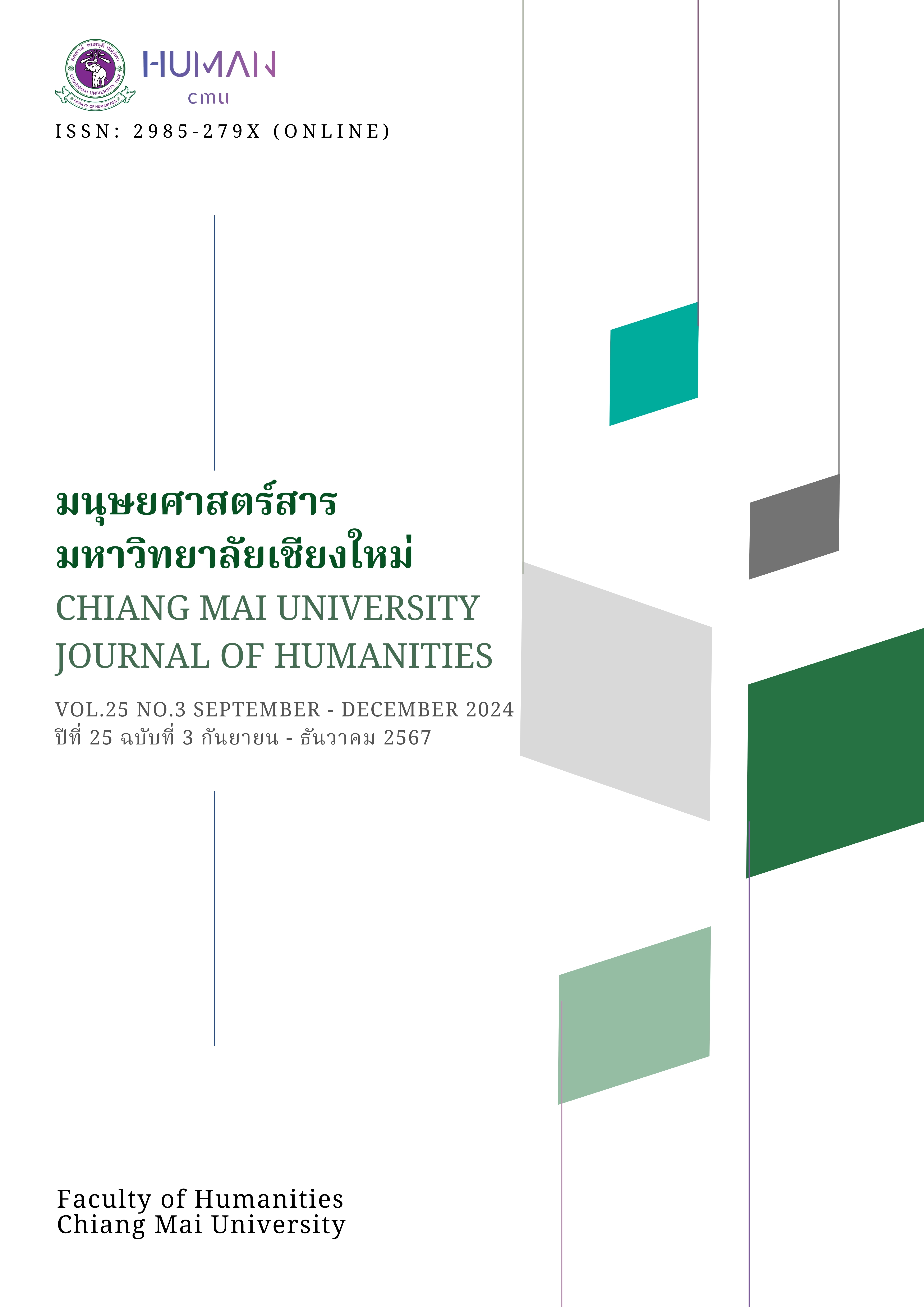วัฒนธรรมคอนเสิร์ตศิลปินเกาหลีในสังคมไทยร่วมสมัย: มุมมองทางสังคมวิทยา
Main Article Content
บทคัดย่อ
บทความวิจัยชิ้นนี้สำรวจวัฒนธรรมคอนเสิร์ตศิลปินเกาหลีในสังคมไทยร่วมสมัยผ่านการศึกษาแนวโน้มของวัฒนธรรมคอนเสิร์ต ความหมายทางวัฒนธรรมของกลุ่มแฟนคลับที่เป็นผู้กระทำการคนสำคัญในการจัดคอนเสิร์ต และพัฒนาเป็นข้อเสนอแนะเพื่อยกระดับการจัดการคอนเสิร์ตให้เป็นเศรษฐกิจเชิงสร้างสรรค์ในสังคมร่วมสมัย บทความชิ้นนี้อาศัยการวิจัยเชิงคุณภาพในลักษณะของการวิจัยเชิงเอกสารร่วมกับการวิจัยชาติพันธุ์วรรณนาออนไลน์และการวิจัยอัตชาติพันธุ์วรรณนา เมื่อได้รับข้อมูลการวิจัยที่ครบถ้วนแล้วจึงนำข้อมูลที่ได้รับมาทำการวิเคราะห์เชิงเนื้อหา
ผลการวิจัยพบว่า แนวโน้มของวัฒนธรรมคอนเสิร์ตศิลปินเกาหลีในประเทศไทยมีความเกี่ยวข้องกับความนิยมของศิลปินและฐานแฟนคลับ อีกทั้งยังมีความเจริญเติบโตสัมพันธ์ไปกับสภาวะความไม่แน่นอนจากการระบาดของโรคโควิด-19 และความพร้อมทางเศรษฐกิจของแฟนคลับ เมื่อพิจารณาความหมายทางวัฒนธรรมของกลุ่มแฟนคลับในคอนเสิร์ตแสดงให้เห็นว่า การแสดงสัญลักษณ์ของวงศิลปินผ่านวัฒนธรรมการมีชื่อเรียกของกลุ่มแฟนคลับ สีประจำวง และแท่งไฟ รวมทั้งการจัดโปรเจกต์ในงานคอนเสิร์ตศิลปิน เป็นแรงกระตุ้นสำคัญที่ทำให้วัฒนธรรมคอนเสิร์ตสามารถดำรงอยู่ได้ ท้ายที่สุด บทความชิ้นนี้ได้นำเสนอแนวทางการยกระดับการจัดการคอนเสิร์ตให้เป็นเศรษฐกิจเชิงสร้างสรรค์ในสังคมร่วมสมัยด้วยการเพิ่มการตลาดและการประชาสัมพันธ์ การสนับสนุนการเติบโตของอุตสาหกรรมดนตรีและการจัดการคอนเสิร์ตทั้งในและต่างประเทศ รวมไปถึงการสนับสนุนจากภาครัฐและเอกชนเพื่อขับเคลื่อนเศรษฐกิจสร้างสรรค์ในประเทศไทย
Article Details

อนุญาตภายใต้เงื่อนไข Creative Commons Attribution-NonCommercial-NoDerivatives 4.0 International License.
เอกสารอ้างอิง
A.Round Entertainment. (2023). Ngan Prakat Rangwan Sut Yingyai Seoul Music Awards [งาน
ประกาศรางวัลสุดยิ่งใหญ่ Seoul Music Awards]. Retrieved from, https://www.a-roundent
.com/archives/35051
Agenda. (2021). ‘Dan Pon Pan Phlak’ Ratthaban Kaolitai Tham Arai ? Wongkan Banthoeng
Kaoli Thueng Pai Radap Lok [‘ดัน ป้อน ปั้น ผลัก’ รัฐบาลเกาหลีใต้ทำอะไร? วงการบันเทิง
เกาหลีถึงไประดับโลก]. Retrieved from, https://www.agenda.co.th/social/south-korea-
fever-industry/
Boonsomrat, R., Jaroenwisan, K., & Pasunon, P. (2023). The Competencies Standard of Human
Resources Affect Competitiveness in Concert Business [มาตรฐานสมรรถนะทรัพยากร
มนุษย์ที่ส่งผลต่อขีดความสามารถทางการแข่งขันในธุรกิจรับจัดงานคอนเสิร์ต]. Rajapark
Journal, 17(52), 301-322.
Bourdieu, P., & Wacquant, L. P. D. (1992). An Invitation to Reflexive sociology. University of
Chicago Press.
Cottingham, M. D. (2016). Theorizing emotional capital. Theory and Society, 45, 451–470.
Illouz, E. & Kotliar, D. M. (2022). Capitalist Subjectivity, Tinder, and the Emotionalization of
the Web. In The Routledge Handbook of Digital Consumption, Llamas, R. & Belk, R.
(eds.), pp.229-240. Routledge.
Jirattikorn, A. (2018). Affective Economy of Thai Television Dramas in Cambodia and China
[เศรษฐกิจเชิงอารมณ์ของละครไทยในกัมพูชาและจีน]. Journal of Sociology and Anthropology,
(2), 97-128.
Korseries. (2022). ‘SUPER JUNIOR’ Klap Ma Sang Khwam Song Cham Sut Prathapchai Kap Elf
Thai Nai Khonsoet ‘SUPER JUNIOR WORLD TOUR SUPER SHOW 9: ROAD in BANGKOK’
[‘SUPER JUNIOR’ กลับมาสร้างความทรงจำสุดประทับใจกับเอลฟ์ไทย ในคอนเสิร์ต‘SUPER
JUNIOR WORLD TOUR SUPER SHOW 9: ROAD in BANGKOK’. Retrieved from, https://
www.korseries.com/super-junior- concert-world-tour-super-show-9-road-in-bangkok/
Korseries. (2023). Ruam Khonsoet Kaoli Fan Meeting Sinlapin Kaoli Ma Prathet Thai Pi 2023
[รวมคอนเสิร์ตเกาหลี แฟน Meeting ศิลปินเกาหลีมาประเทศไทย ปี 2023]. Retrieved from,
https://www.korseries.com/korevent/
Kozinets, R. V. (2010). Netnography: Doing ethnographic research online. SAGE.
Laophilai, P., & Chantamala, O. (2022). The Development of “Ra Beyb Wa Thasil” Moh Lumfor
Public Performance [พัฒนาการรูปแบบการแสดงคอนเสิร์ตหมอลำคณะระเบียบวาทศิลป์].
Journal of Social Science for Local Rajabhat Mahasarakham University, 6(1), 174-183.
Phadungkan, S. (2013). Som Mong ! Thailand Dan Concert Sinlapin Topthao Khao Thai
Khuekkhak Ha Khamtop Concert Sathon Setthakit Dai Ching Ruemai ? [สมมง! ‘ไทย
แลนด์แดนคอนเสิร์ต’ ศิลปินตบเท้าเข้าไทยคึกคัก หาคำตอบ ‘คอนเสิร์ต’ สะท้อนเศรษฐกิจได้
จริงหรือไม่?]. Retrieved from, https://www.marketingoops.com/reports/concert-in-
thailand/
Ponanake, P. (2022). Efficiency Development of Logistics Management Guideline of the
Organizer via Y Series Fan Meeting Paradigm among the Culture Changing [แนวทางการ
พัฒนาประสิทธิภาพการจัดการโลจิสติกส์อุตสาหกรรมผู้รับจัดงานแสดงคอนเสิร์ตในบริบทแฟน
มีตซีรีส์วายจากการเลื่อนของวัฒนธรรม]. Interdisciplinary Sripatum Chonburi Journal, 8(1),
-98.
Ritchai, T., & Chansuwan, P. (2022). Creation of Art Production Form a Live Concert “Babb Bird
Bird Show” Gmm Grammy Public Company Limited [กระบวนการสร้างศิลปะการแสดงใน
งานแสดงคอนเสิร์ตแบบเบิร์ด เบิร์ด โชว์ บริษัท จีเอ็มเอ็ม แกรมมี่ จำกัด (มหาชน)]. Journal of
Liberal Art of Rajamangala University of Technology Suvarnabhumi, 4(1), 13-26.
Sakwit, K. (2022). Fitness at a distance: towards marginal differences in global fitness. Leisure
Studies, 41(6), 802-815.
Swartz, D. (1997). Culture and power: the sociology of Pierre Bourdieu. The University of
Chicago Press.
Tubtimthongcha, K. (2015). The Management of Symphony Orchestras in Thailand in Singapore
[การบริหารจัดการวงซิมโฟนีออร์เคสตร้าในประเทศไทยและประเทศสิงคโปร์]. Institute of
Culture and Arts Journal, 16(2), 24-35.
Vandenberg, F., & Berghman, M. (2023). The show must go on(line): Livestreamed concerts
and the hyper-ritualisation of genre conventions. Poetics, https://doi.org/10.1016/j.
poetic.2023.101782
Weber, W. (2003). Music and the Middle Class: The Social Structure of Concert Life in London,
Paris and Vienna between 1830 and 1848. Routledge.


